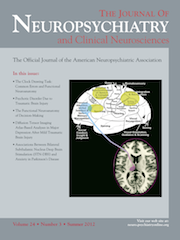Low-Dose Aripiprazole in the Treatment of SSRI-Induced Bruxism
To the Editor: Bruxism is characterized by involuntary, repetitive movements of jaw-clenching and teeth-grinding. Several reports in the literature suggest that selective serotonin reuptake inhibitors (SSRIs) might induce bruxism.1 In that event, clinicians face difficult treatment decisions, especially in cases whereby SSRIs cannot be discontinued or decreased, as in obsessive-compulsive disorder (OCD). In the following, we report the case of a patient with severe OCD and SSRI-induced bruxism successfully treated with low-dose aripiprazole.
Case Report
This is a 63-year-old woman with a 40-year history of severe OCD, with poor response to numerous treatments. For the last 5 years, the patient was receiving fluoxetine 40 mg/day. Owing to a recent severe worsening of her symptoms (Yale-Brown Obsessive-Compulsive Scale score: 32), fluoxetine was replaced by escitalopram up to 60 mg/day, and, within 6 weeks, patient’s symptoms improved moderately (Y-BOCS score: 23). However, she started then to complain of involuntary jaw movements of grinding and clenching her teeth all day long and, as a result, she experienced severe tooth pain and headache. Her examination through the Abnormal Involuntary Movement Scale (AIMS)-section for rating facial and oral movements- yielded a score of 7. Escitalopram was decreased to 40 mg/day for the next 4 weeks without any improvement of her bruxism, and, moreover, with worsening of her OCD symptoms (Y-BOCS score: 27). Fluoxetine up to 60 mg/day was then substituted for escitalopram for another 4 weeks, with an amelioration of her OCD symptoms (Y-BOCS score: 22). However, her bruxism persisted unabated. At that time, aripiprazole 10 mg/day was added to her regimen, and, within 1 week, her bruxism subsided (AIMS facial and oral movements score: 2). The patient was then referred for CBT and, until her last follow-up 6 months later, she remained free from abnormal orofacial movements.
Discussion
Masticatory motor activity is controlled by dopaminergic neurons of the mesocortical tract. Dopamine inhibits spontaneous movement, whereas serotonin inhibits dopaminergic transmission in this tract, and thus, releases the characteristic repetitive muscle contractions of bruxism.2 Activation of 5-HT1A auto- and hetero-receptors reduces serotoninergic inhibition of the dopaminergic–mesocortical tract, and thus restores control of spontaneous movements. Extant case reports suggest that the 5-HT1A agonists buspirone and tandospirone are efficacious in the treatment of SSRI-induced bruxism.2,3
Aripiprazole is a partial agonist/antagonist at dopamine D2 and D3 and serotonin 5-HT1A receptors and antagonist at the 5-HT2A receptors. We hypothesize that its beneficial effect on bruxism is attributable to its partial-agonist activity on dopamine receptors and above all to its partial-antagonist action on 5-HT1A receptors, jointly overwhelming its antagonism of the 5-HT2A receptors. Of note, aripiprazole at low doses might be efficacious only in SSRI-induced bruxism. Indeed, in a manic patient, the combination of aripiprazole at 15 mg/day with lithium carbonate 1,200 mg/day, which increases aripiprazole serum levels by 43%,4 has been associated with induction of bruxism along with akathisia and parkinsonism.5 Although anecdotal, our case suggests that low-dose aripiprazole might be a promising new treatment of SSRI-induced bruxism.
1 : Reports of SSRI-associated bruxism in the family physician’s office. J Orofac Pain 2001; 15:340–346Medline, Google Scholar
2 : Buspirone as an antidote to SSRI-induced bruxism in 4 cases. J Clin Psychiatry 1999; 60:857–860Crossref, Medline, Google Scholar
3 : Paroxetine-induced bruxism effectively treated with tandospirone. J Neuropsychiatry Clin Neurosci 2007; 19:90–91Link, Google Scholar
4 : Influence of comedication on serum concentrations of aripiprazole and dehydroaripiprazole. Ther Drug Monit 2009; 31:233–238Crossref, Medline, Google Scholar
5 : Aripiprazole-associated bruxism, akathisia, and parkinsonism in a bipolar patient. J Clin Psychopharmacol 2011; 31:134–135Crossref, Medline, Google Scholar



